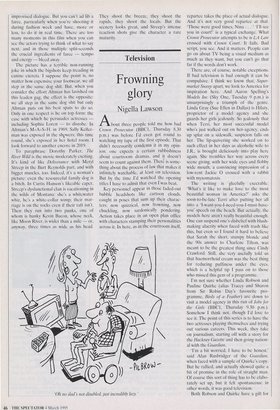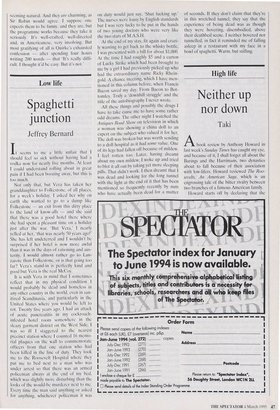Television
Frowning glory
Nigella Lawson
About three people told me how had Crown Prosecutor (BBC1, Thursday 8.30 p.m.) was before I'd even got round to watching my tape of the first episode. That didn't necessarily condemn it in my opin- ion: one expects a certain ruhhishiness about courtroom dramas, and it doesn't seem to count against them. There is some- thing about the process of law that makes it infinitely watchable, at least on television. But by the time I'd watched the opening titles I have to admit that even I was beat.
Key personnel appear in those faded-out bubble headshots like cartoon clouds, caught in poses that sum up their charac- ters: now quizzical, now frowning, now chuckling, now sardonically pondering. Action takes place in an open plan office with characters stamping their personalities across it. In here, as in the courtroom itself,
'Oh no dad not disabled, first incredibly lazy.'
repartee takes the place of actual dialogue. And it's not very good repartee at that. `Those were good times, Nina ... "I'll see you in court!' is a typical exchange: What Crown Prosecutor attempts to he is LA Law crossed with Crown Court. It fails. Bad script, you see. And it matters. People can go on about TV being a visual medium as much as they want, but you can't go that far if the words don't work.
There are, of course, notable exceptions. If had television is had enough it can be compulsive. I think we know that, Super- market Sweep apart, we look to America for inspiration here, And Aaron Spelling's Models Inc (Sky One, Tuesday 9 p.m.) is unsurprisingly a triumph of the genre. Linda Gray (Sue Ellen in Dallas) is Hilary, proprietor of a model agency and she guards her girls jealously. So jealously that when Terri, her most successful model who's just walked out on her-agency, ends up splat on a sidewalk, suspicion falls on her. The lip-quivering she worked on to such effect in her days as alcoholic wife to J.R., is brought deliciously into play here again. She trembles her way across every scene giving, with her wide eyes and Bobby wide mouth, a convincing impression of a low-rent Jackie 0 crossed with a rabbit with myxomatosis.
The writing is -gleefully execrable: `What's it like to make love to the most beautiful woman in America?' asks the soon-to-be-late Terri after putting her all into a 'I-want-you-I-need-you-I-must-have- you' speech on the beach. But actually, the models here aren't really beautiful enough. One can suspend one's disbelief with blush- making alacrity when faced with trash like this, but even so I found it hard to believe that Sarah the short, stumpy blonde and the 90s answer to Charlene Tilton, was meant to he the greatest thing since Cindy Crawford. Still, she very usefully told us that haemorrhoid cream was the best thing for reducing puffiness under the eyes, which is a helpful tip I pass on to those who missed this gem of a programme.
I'm not sure whether Linda Robson and Pauline Quirke (alias Tracey and Sharon From Sir Robin Day's favourite pro- gramme, Birds of a Feather) are down to visit a model agency in this run of Jobs JrO the Girls (BBC1, Thursday 9.30 p.m.). Somehow I think not, though I'd love to see it. The point of this series is to have the two actresses playing themselves and trying out various careers. This week, they take on journalism, starting off with a story for the Hackney Gazette and then going nation- al with the Guardian.
`I'm a bit worried, I have to he honest,' said Alan Rusbridger of the Guardian. when faced with a sample of Quirke's copy. But he rallied, and actually showed quite a bit of promise in the role of straight man. Of course this sort of thing has to he elabo- rately set up, but it felt spontaneous: in other words, it was good television.
Both Robson and Quirke have a gift for
seeming natural. And they are charming, as Sir Robin would agree. I suppose one expects them to be funny, and they are, but the programme works because they take it seriously. It's well-crafted, well-directed and, in Americanese, very involving. But most gratifying of all is Quirke's exhausted confession — after spending four hours writing 200 words — that 'It's really diffi- cult. I thought it'd be easy. But it's not.'



























































 Previous page
Previous page